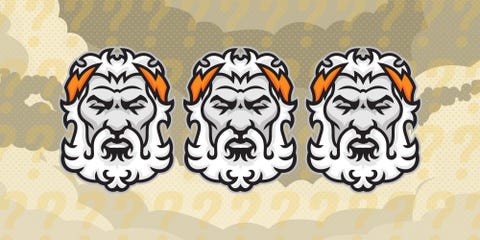Solution to Riddle of the Week: The Hardest Logic Puzzle Ever
Difficulty level: Hardest Ever
By Jay Bennett MICHAEL STILLWELL
MICHAEL STILLWELLThis puzzle is a variation of the knights and knaves puzzles created by American mathematician Raymond Smullyan. It was published for the first time in its basic form by American philosopher and logician George Boolos, who included it in the Harvard Review of Philosophy in 1996. American computer scientist John McCarthy is credited with adding the challenge of not knowing the meanings of ja and da.
The problem has since become known as "the hardest logic puzzle ever."
Like many of the best challenging logic puzzles, this one seems downright impossible at first glance.
The first step is to find one of these gods that will answer you consistently.
Background Information
(For the direct solution, scroll down.)
First, you need to identify a god who is not Random. To do this, we need to ask the gods a hypothetical question. This way, you can get both True and False to answer in the same way.
Let's take a look at why. Say you ask, "Is the sky blue?" True will answer yes (or his word for "yes"), and False will answer no.
But let's say you ask, "If I were to ask you if the sky is blue, would you say yes?" In this case, the god True would still answer yes. And False must also answer yes when the question is posed this way. He is basically saying, "Yes, I would say yes," when in fact he would say no, making the statement a lie.
We cant' stop here, though, because the gods don't say yes and no, they say ja and da. Fortunately, you can still get them to give you some information. Let's say you ask, "If I were to ask you if the sky is blue, would you say ja?"
If ja means yes, then Truth would say ja. If ja means no, then Truth would still say ja. If ja means no, he is effectively saying: "no, if you asked me if the sky were blue I would not say no." Because the question is a hypothetical, and False lies about what he would actually do (the double negative creates a positive), his answers will be the same as the answers from Truth.
So by phrasing your questions as hypotheticals, you can ask the gods an embedded question ("if I were to ask you [embedded question]..."). As long as you ask either True or False, the god will respond with the same word you use ("would you say ja?") if the answer to the embedded question is affirmative, and the opposite word if the answer is negative. You don't even need to know what ja and da mean for this trick to work.
Solution
First, ask the god standing in the middle, "If I were to ask you if the god to your left is Random, would you say ja?"
If the god says ja, then there are two possibilities: either the god to his left is Random, and the god speaking is either True or False; or the god speaking is Random. Either way, you know the god to his right is not Random.
Similarly, if the god says da, then there are two possibilities: either the god to his right is Random, and the god speaking is True or False; or the god speaking is Random. In this case, you know the god to the left is not Random.
The next step is to approach the god that you know is not Random, and figure out if he is True or False. Because you still do not know the meanings of ja and da, you need to do this by using the same hypothetical structure, asking, "If I were to ask you if you are True, would you say ja?" If the god is True, they will answer ja. If the god is False, they will answer da. (False's response in this case is essentially either: "no I would not say yes," even though he would; or "yes I would say no," even though he wouldn't.)
Finally, now that you have identified a god as either True or False, you can use the same question structure one last time to identify the other gods (you need to stick to it because you still don't know the meanings of ja and da). Simply ask, "If I were to ask you if the god in the middle is Random, would you say ja?" If the answer is ja, then the god in the middle is Random, and the third god is either True or False (the opposite of the one you have already identified). If the answer is da, then the god in the middle is True or False, and the third god is Random.
Congratulations! You have identified the three gods despite their stubborn refusal to speak English. Interestingly enough, you must not waste a question to figure out what ja and da mean, otherwise you would not have enough questions left to identify all three gods. So you leave the archipelago that these gods rule over, and the knights and knaves who worship them, with promises of good fortune and prosperity.
No comments:
Post a Comment